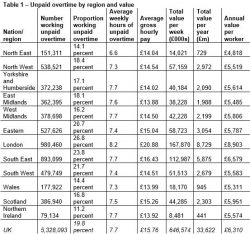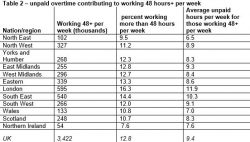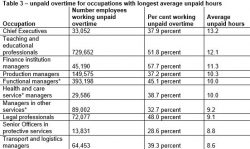UK workers gave their employers £33.6 billion of free labour last year by doing unpaid overtime, according to new analysis of official statistics published by the TUC – the TUC’s 13th annual Work Your Proper Hours Day. Comment from UC General Secretary Frances O’Grady.
To date, the average person doing unpaid overtime has effectively worked the year so far for free. More than 5.3 million people put in an average of 7.7 hours a week in unpaid overtime during 2016. This is equivalent to an average of £6,301 they have each missed out in their annual pay packets. To mark the day, the TUC is asking workers to take a proper lunch break and leave on time. Managers could lead by example and also think about how they can move away from over-reliance on their staff’s unpaid overtime. The TUC has designed a calculator at http://act.goingtowork.org.uk/page/content/unpaid-overtime for workers to find out how much more they would get paid each year if their unpaid overtime was paid at their usual rate. The TUC is warning that working time protections could be weakened after Brexit. Although the government plans to transfer EU working time rights into UK law, they will be more vulnerable to erosion and repeal by future governments. And it could lead to a weaker interpretation of the rights in UK courts than has been established in case law by the European Court of Justice.
TUC General Secretary Frances O’Grady said: “Few of us mind putting in some extra time when it’s needed. But if it happens all the time and gets taken for granted, that’s a problem. So make a stand today, take your full lunch break and go home on time. The best bosses understand that a long-hours culture doesn’t get good results. So we’re asking managers to set an example by leaving on time too. Anyone worried about the long-hours culture in their workplace should get together with workmates and join a union. That way you can get your voices heard and get the support you need to make sure your boss doesn’t break the rules. The government still doesn’t have a water-tight plan to stop working time protections getting weaker when we leave the EU. The Prime Minister should promise to put a guarantee into our future trade deals with Europe that British workers will have a level playing field with EU workers.”



Source: the TUC’s analysis used unpublished ONS data from the Labour Force Survey (July-September 2016) and the Annual Survey of Hours and Earnings (2016)
*Functional managers: financial managers, marketing and sales directors, purchasing managers, advertising and public relations directors, human resource managers, IT managers. Other services: includea wholesale, waste disposal, estate agents, hairdressing and garages. Health and cares service managers: includes health care GP practices and residential day, domiciliary and home care. Health and cares service managers includes health services and social services. Both classifications include private and public sector employees.
Key findings
Gender: The TUC study reveals that men work 1.2 billion unpaid overtime hours a year, compared to 1.0 billion hours for women. Around one in five (19.9 percent) men work unpaid overtime, averaging 8.3 hours per week. A similar percentage of women (19.7 percent) also put in unpaid hours. Despite the fact that many women work part-time the average for those undertaking unpaid overtime is still 7.1 hours a week. Age: People in their forties are most likely to do unpaid overtime, with more than one in four (26.2 percent) in this age group putting in unpaid hours compared to an average of one in five (19.8 percent) for all UK workers.
Public sector: Public sector workers contributed £12.2 billion of unpaid overtime last year. Public sector employees make up a quarter (25.7 percent) of total employees but produce a third (36.3 percent) of all unpaid overtime.
Occupations: Looked at on an individual basis, chief executives work the most unpaid hours on average each week (13.1 hours). They are closely followed by teachers and education professionals (12.1 hours per week), followed by financial institution managers (11.3 hours), production managers (10.3 hours), functional managers such as financial, marketing, and personnel managers (10.0 hours) and health and care service managers (10.0 Hours). As an occupational sector, more unpaid hours are worked in total by teachers and education professionals (729,652) than any other.
Region: Unpaid overtime workers in London put in the most unpaid hours, clocking up 8.2 hours a week, compared to the national average of 7.7 hours). More than 1 in 4 workers in London (26.8 percent) are doing unpaid overtime, compared to the national average of one in five (19.8 percent). The South East follows close behind, with 23.8 percent working unpaid overtime, whilst 21.7 percent in the South West and 20.7 percent in the Eastern Region are working free hours.
Unpaid hours for those working above the 48-hour weekly limit: More than 1.6 million UK employees are currently working over the 48-hour limit of the EU Working Time Directive due to unpaid overtime. Of these, 35 percent are women (0.5m). In occupations where 48+ hour weeks are most common, the average worker does 13.8 hours of unpaid work per week. London is the long hours capital, with 590,000 employees working 48+ hours per week and averaging 11.9 unpaid hours, followed by the South East with 540,000 employees working 48+ hours and averaging 10.3 unpaid hours a week.









